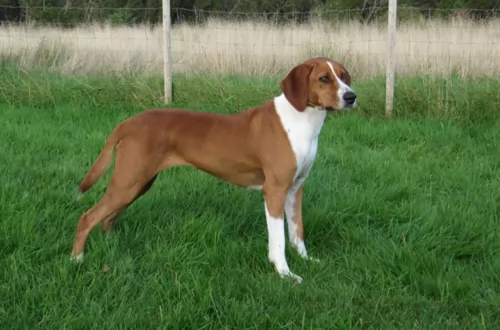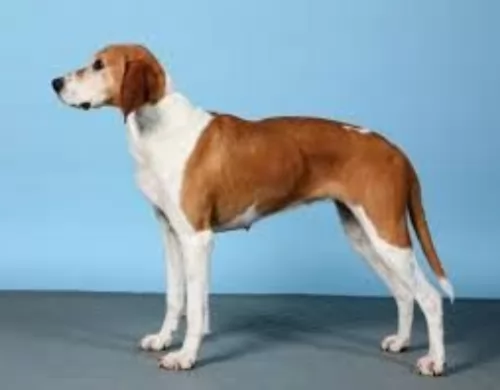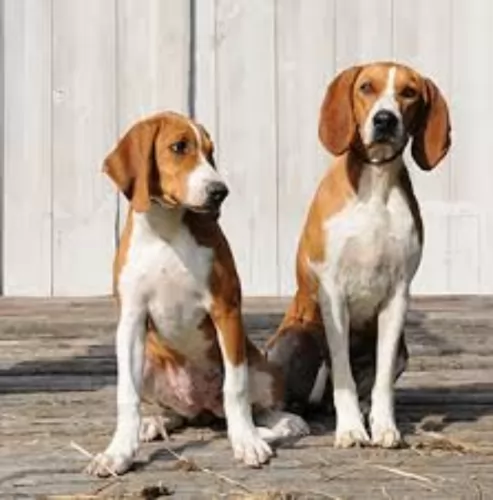 Petzlover
Petzlover Hygenhund is originated from Norway but Saarlooswolfhond is originated from Netherlands. Hygenhund may grow 14 cm / 5 inches shorter than Saarlooswolfhond. Hygenhund may weigh 20 kg / 44 pounds lesser than Saarlooswolfhond. Hygenhund may live 3 years more than Saarlooswolfhond. Both Hygenhund and Saarlooswolfhond has almost same litter size. Hygenhund requires Moderate Maintenance. But Saarlooswolfhond requires Low Maintenance
Hygenhund is originated from Norway but Saarlooswolfhond is originated from Netherlands. Hygenhund may grow 14 cm / 5 inches shorter than Saarlooswolfhond. Hygenhund may weigh 20 kg / 44 pounds lesser than Saarlooswolfhond. Hygenhund may live 3 years more than Saarlooswolfhond. Both Hygenhund and Saarlooswolfhond has almost same litter size. Hygenhund requires Moderate Maintenance. But Saarlooswolfhond requires Low Maintenance
 The Hygenhund is a hound from Norway that was developed in the early 1800’s by the Norwegian breeder Hygen. It was developed for hunting small game such as fox, rabbit, hare or racoon. It is known for its endurance and ability to survive travel across vast artic land without fatigue. It was developed by crossing several Norwegian hounds with ones from England and Germany. This includes basset hounds, holsteiner hounds, beagles, Bloodhounds, Scandinavian hounds and English Pointers. The resulting Hygehound is a scent hound whose popularity fell in the 20th century. Most of the remaining dogs today are located in Norway. The Norwegian Kennel Club and the UKC have both recognized the breed yet its numbers remain low. Even at that the breed today remains a great hunting dog but it is also a great companion or family dog.
The Hygenhund is a hound from Norway that was developed in the early 1800’s by the Norwegian breeder Hygen. It was developed for hunting small game such as fox, rabbit, hare or racoon. It is known for its endurance and ability to survive travel across vast artic land without fatigue. It was developed by crossing several Norwegian hounds with ones from England and Germany. This includes basset hounds, holsteiner hounds, beagles, Bloodhounds, Scandinavian hounds and English Pointers. The resulting Hygehound is a scent hound whose popularity fell in the 20th century. Most of the remaining dogs today are located in Norway. The Norwegian Kennel Club and the UKC have both recognized the breed yet its numbers remain low. Even at that the breed today remains a great hunting dog but it is also a great companion or family dog.
 Dutch breeder Leendert Saarloos began to breed German Shepherds to a European wolf. His goal was to bring out a dog that was more hard working.
Dutch breeder Leendert Saarloos began to breed German Shepherds to a European wolf. His goal was to bring out a dog that was more hard working.
The Dutch Kennel Club recognized this dog breed in 1975, and to give honor to the breeder, they gave the name to the dog - Saarloos Wolfdog. The dog was also recognized by the Federation Cynologique Internationale.
Today the Saarloos is regarded as a pet and companion. It was in 2015 that a study found that this dog showed more genetic association with the gray wolf.
 The Hygenhund has a solid rectangular and compact body with muscular and compact legs and paws. Their heads are shaped like a triangle with dark eyes and a broad skull. The muzzle and neck are long and the topline is even. They carry their tail high, but they do not curl it over their back. They are a medium sized dog with short hair. They have an overabundance of energy and get bored easily. They can come in black with chestnut or white markings, yellow and red, chestnut without or with black markings.
The Hygenhund has a solid rectangular and compact body with muscular and compact legs and paws. Their heads are shaped like a triangle with dark eyes and a broad skull. The muzzle and neck are long and the topline is even. They carry their tail high, but they do not curl it over their back. They are a medium sized dog with short hair. They have an overabundance of energy and get bored easily. They can come in black with chestnut or white markings, yellow and red, chestnut without or with black markings.
 The Saarloos Wolfdog is a large dog standing at between 60–75cm male and female and weighing between 30 and 45kg. He is athletic and muscular with a short, dense coat. Colors are wolf-grey, white and red. The Saarloos has wolf-like expressions so the ears are erect, the muzzle pointed and the tail long and plumed. They eyes are a yellow color. The face is bright and alert, showing how intelligent he is.
The Saarloos Wolfdog is a large dog standing at between 60–75cm male and female and weighing between 30 and 45kg. He is athletic and muscular with a short, dense coat. Colors are wolf-grey, white and red. The Saarloos has wolf-like expressions so the ears are erect, the muzzle pointed and the tail long and plumed. They eyes are a yellow color. The face is bright and alert, showing how intelligent he is.
The Saarloos Wolfhound is full of energy so will be looking toward his owner to come up with good exercise for him.
A walk will always be welcome, but for such a lively dog, he’ll want something more energetic such as a hike, swimming, being allowed to run off his leash in the park and lots of vigorous ball- and rope games.
He is an independent dog and for this reason you’ll want him trained and socialized to make him obedient. He is loyal and loving but some of his wolf-like characteristics might mean that he isn’t a good choice for the first-time dog owner. If the first time dog owner is firm, consistent, strong and kind, then everything will be alright.
 1. Children friendliness – The Hygenhund is very friendly to children and love to play with them.
1. Children friendliness – The Hygenhund is very friendly to children and love to play with them.
Stamina, intelligence and ability to endure cold climates.
Very adaptable in some ways – enduring cold climates for instance. However, they need a large yard or area to run in. They are not as adaptable in an apartment.
The Hygenhund is very intelligent and a quick learner. They love learning new things.
 The Saarloos Wolfhound is a beautiful wolf-like dog that is full of life and energy. When you bring him into your life, you’re going to to have a wonderful addition to your family.
The Saarloos Wolfhound is a beautiful wolf-like dog that is full of life and energy. When you bring him into your life, you’re going to to have a wonderful addition to your family.
He is an independent dog that is strong-willed so it pays to have him trained and socialized, and then he becomes a balanced, well mannered dog that is loving and loyal with his beloved human family.
 A well bred Saarloos Wolfhound is regarded as very healthy, and with good care they can reach up to 12, 13, 14 or 15 years of age.
A well bred Saarloos Wolfhound is regarded as very healthy, and with good care they can reach up to 12, 13, 14 or 15 years of age.
This is a common canine disease which comes about when a dog’s hip joints don’t develop properly. For a dog diagnosed with hip dyslasia it can be painful lying down and getting around.
Hip dysplasia is a genetic condition, but diet also plays a part as well as environmental factors. All dogs breeds are susceptible to hip dysplasia. Try and avoid your dog putting on too much weight as then it puts excessive strain on the joints. There are different treatment options to make it more comfortable for your pet.
 Since the Hygenhund is such a high energy working dog feed a high quality food. Feed 3-4 times a day for a total of 2.3 cups.
Since the Hygenhund is such a high energy working dog feed a high quality food. Feed 3-4 times a day for a total of 2.3 cups.
Again this is a high energy dog. Feed a high protein good quality dog food twice a day for a total of 3-4 cups.
Good speed and stamina. Good in cold climates.
The Hygenhund needs plenty of exercise to dissipate all its working energy. They will excel at field trials, lure coursing, fly ball, tracking, and agility.
 He’s an active dog so he will need a good dose of exercise to keep that muscular, lean look.
He’s an active dog so he will need a good dose of exercise to keep that muscular, lean look.
You will need to brush the dense double coat twice a week to ensure the removal of loose hairs and to keep the coat shiny and glossy. Trim his nails and check inside his mouth as he can’t tell you when he has a rotten tooth which can cause a lot of pain.
Feed puppies 4x a day.
Puppies 6 months on can have 2 meals a day.
Always feed your dog premium-quality dry food. Twice a week you can add home-made food to the dry kibble as a tasty treat. Add boiled chicken, brown rice or pasta and spinach, sweet potatoes and carrots. This food can all be chopped up and a portion added to the kibble. The rest can be frozen and then a portion warmed up for another meal.
Try and add some raw meat to his food occasionally as this helps to keep skin problems at bay.
Ensure there is always a bowl of fresh, cool water within his reach.
Your pet needs a warm, dry, comfortable place to sleep to call his own.
If your dog spends a lot of time outdoors, make sure there is both shade and sun.
Spaying and Neutering – beneficial if you don’t want puppies.
Vaccinations for puppies and adults to stave off deadly canine diseases.